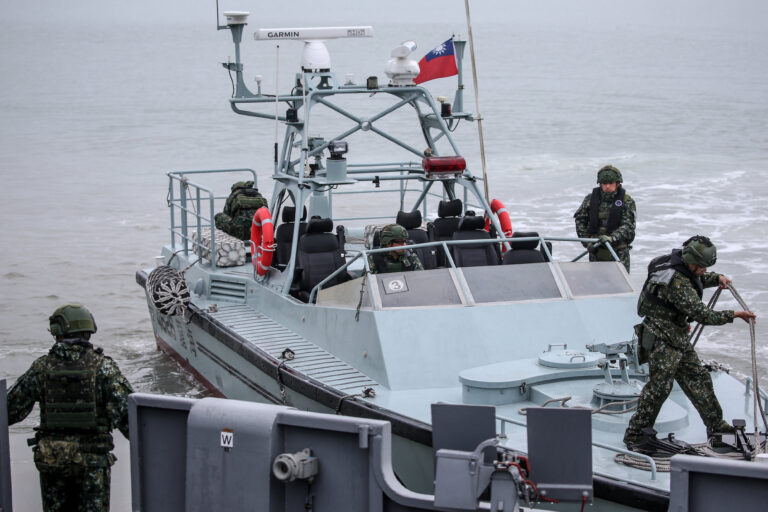Members of the Taiwanese military conduct routine drills at Liaoluo port on Kinmen island on May 24, 2024. China surrounded Taiwan with naval vessels and military aircraft on May 23 in a military exercise aimed at punishing the island after its new president vowed to uphold democracy. (Photo by I-HWA CHENG/AFP via Getty Images)
Chen Yihua | AFP | Getty Images
The escalation of tensions comes just days after Lai was sworn in on Monday, and in his inaugural speech he urged China to end political and military threats against the self-ruled island.
China’s state-run Xinhua News Agency said Taiwan’s new leader had taken “a more dangerous and radical approach than his predecessor” in his inaugural address. It added that the drills were “legitimate, timely and entirely necessary” as any act of “Taiwan independence” was “unacceptable.”
“This feels like a precursor to more and larger military exercises to come,” Wenthi Song, an adjunct fellow at the Atlantic Council’s Global China Hub, said in a post on X.
“This is a signal that will shape the international narrative. The real ‘punishment’ for Taiwan may yet come, as it will take time.”
China considers democratically ruled Taiwan to be part of its territory, and President Xi Jinping has previously said unification with mainland China is a “historical inevitability”.
China’s defence ministry said the drill, dubbed “United Sword 2024A”, was a “powerful punishment” against “separatist forces seeking ‘independence'”.
The exercise was announced to focus on “joint seizure of comprehensive battlefield control and joint precision strikes against key targets.”
The People’s Liberation Army’s Eastern Theater Command also announced that it had conducted maritime attacks, ground attacks, air defense, and anti-submarine attacks in the air and sea areas north and south of Taiwan Island.
In response, Taiwan was put on high alert and its coast guard sent patrol boats to monitor Chinese military movements.
Political commentators say the escalation is a signal that Beijing may be toughening its stance towards Taiwan under the leadership of Lai Ming, whom China describes as a “staunch activist for Taiwan independence” and a dangerous separatist.
While signals prior to his inauguration had indicated a more moderate response, “Beijing appears to have been shocked by Lai’s positive comments on Taiwan’s sovereignty and identity,” the Eurasia analysts said.
In his speech on Monday, Lai said Taiwan’s constitution clearly stipulates that the Republic of China (Taiwan’s official name) and the People’s Republic of China “are not subordinate to each other”.
He added that all political parties should “oppose annexation and defend sovereignty.”
Chinese Foreign Minister Wang Yi criticised Lai on Tuesday, saying “no matter what tactics they use, they cannot stop China from finally achieving complete reunification,” state media reported.
Taiwan’s Defense Ministry condemned China’s drills as “unreasonable provocations” that undermine regional peace and stability.
“This pretext for conducting military exercises not only does not contribute to peace and stability in the Taiwan Strait, but also highlights Taiwan’s hegemonic nature,” the ministry said.
Eurasia analysts noted that while the PLA exercises fall short of China’s response to former U.S. House Speaker Nancy Pelosi’s visit to Taiwan in August 2022, it did conduct unprecedented coast guard patrols around several offshore islands that Taiwan controls.
“Fujian Coast Guard vessels patrolled up to 2.8 nautical miles and three nautical miles from Wuqiu Island and Dongyin Island respectively this week, entering the ‘no fishing zone’ for the first time,” the agency said.
Under Xi, China has stepped up diplomatic, economic and military pressure on Taiwan as it strengthens informal ties with the United States.
Xi told U.S. President Joe Biden on the sidelines of the APEC summit in November that Taiwan has always been the “most important and sensitive” issue in U.S.-China relations.
Gabriel Wildau, managing director of Teneo Intelligence, said U.S. politics will also influence cross-strait relations.
“Regardless of the outcome of the US presidential election, tensions will likely escalate if Republicans gain control of both houses of Congress in the November elections,” he added.
Moreover, as Lai grows more confident in his new role as president, he may be “emboldened” to move further away from the relatively cautious stance of his predecessor, Tsai Ing-wen, and “act on his pro-independence instincts,” Wildau said.
While a war over Taiwan is unlikely over the next decade, observers say Beijing is likely to deploy these familiar military tools with greater frequency and intensity.
Eurasia analysts said the drills signaled that cross-strait relations had entered a “period of uncertainty.”
But he added that China “will refrain from taking any actions that could jeopardize U.S.-China stabilization efforts on the Taiwan issue, at least through the U.S. presidential election.”

